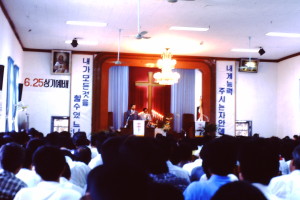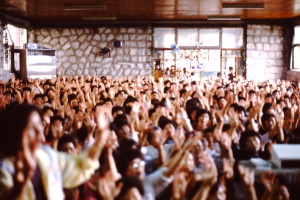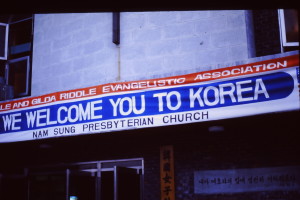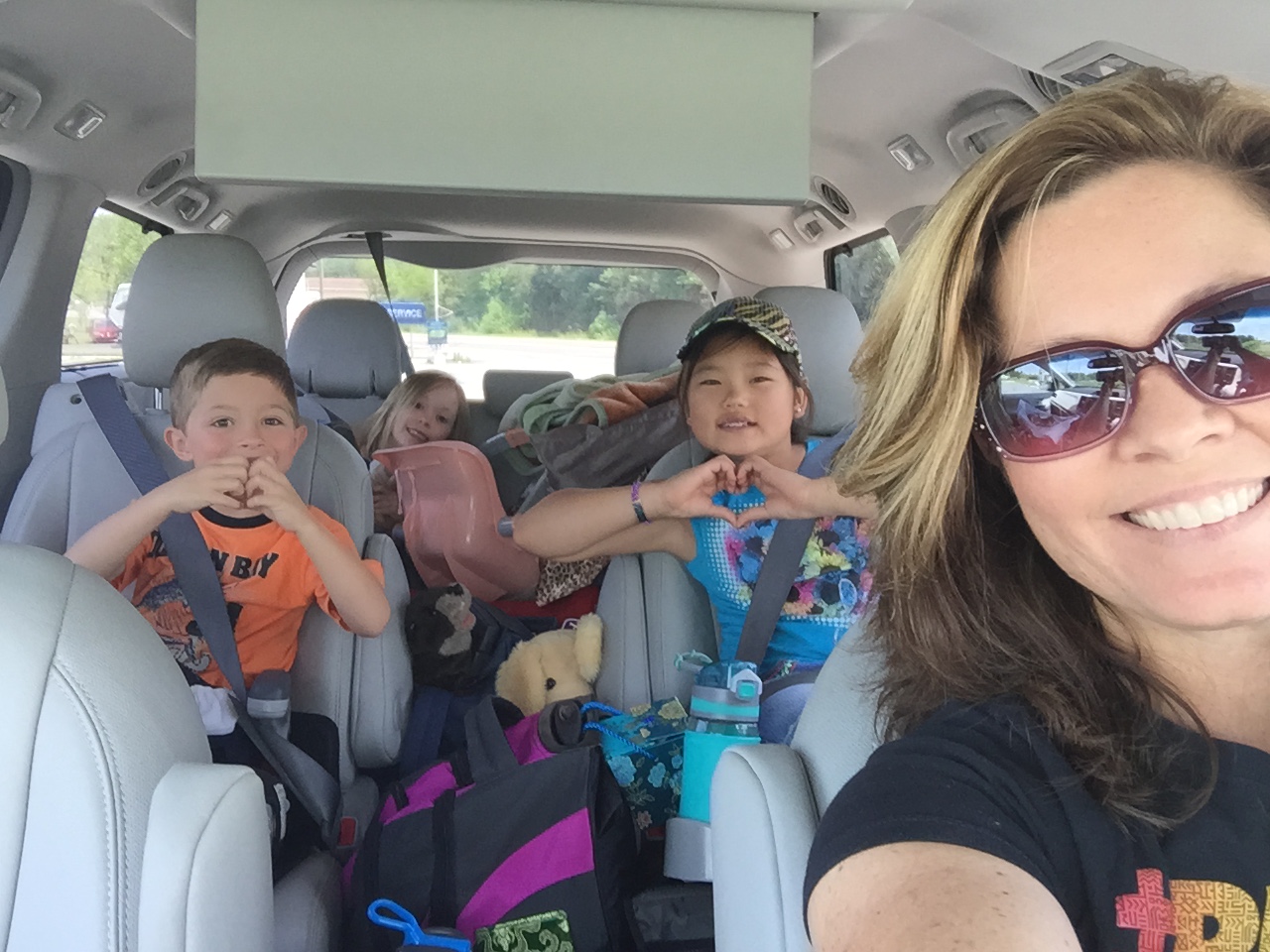My Dad, Dale Riddle, recently brought up a powerful experience that I felt compelled to share. Occasionally, God provides moments of clarity (which can also be moments that are perplexing and unsettling) that are immediately pivotal. We can no longer travel down the same road and are set on a different course (much like the Biblical story of Saul who was changed on the road to Damascus.) My Dad had one of these experiences in Korea and the impact lives on, in him and in all of us who are close to him. That’s the beautiful thing about sharing our stories.
My Dad traveled to Korea on a mission trip about thirty years ago with a team of seven other pastors. It was a life-changing trip for him because (although he had traveled to many countries) he had never met people so hungry for the gospel. Various denominations worked together for the greater good (they worked with Pentecostals, Presbyterians, Methodists, Independent Baptists, etc.).
Dad said, “Coming from America, where Christians can be so divided, it was amazing to see that kind of unity.”
He had the opportunity to preach at the largest Presbyterian church in the world, at a prison, a couple of Pentecostal “prayer mountain” meetings (these were fascinating – I will have to write about that experience another time), and a small Methodist church. At the Methodist church, Dad was blown away when he showed up for a 6:00 a.m. prayer meeting on a Monday morning and the church was packed. After praying aloud together for about 30 minutes, the pastor spoke briefly and issued the challenge “Now go into the world today and tell others how much Jesus loves them.” Dad said that the church gathered like that every single morning to prepare themselves to “be” the gospel out in the world.
One of the Korean pastors wanted to show Dad some of the ministries the church was involved in, so they visited a leper colony (another fascinating story) and an orphanage.
And while the hunger and passion for the gospel was incredibly faith-affirming and encouraging for my Dad, the experience at the orphanage broke his heart open in new ways.
At the orphanage, he met at least 25 children who were profoundly handicapped (mentally, physically), hidden away, unwanted by society. Five of the children had literally been pulled from the river where they had been dumped like trash. Others had been abandoned. The orphanage was run by a Korean celebrity couple of sorts (a retired fighter and a former Miss Seoul Korea) and my Dad was humbled that this couple who “had it all” would choose to take in all these discarded children. Dad said that the American pastor who accompanied him to the orphanage wept the entire time. The pastor asked, “Why do these kinds of things happen?” and somehow that question prompted the caregiver at the orphanage to add another layer of mystery to consider. They introduced a very young child who had been born with both genitalia (with discretion and respect – it was not to embarrass the child but to show the complexity of why these children were abandoned). My Dad had heard of hermaphrodites, but hearing about something in the abstract and seeing it first hand are completely different.
As we discussed his experience, Dad said, “When you see something like that, you realize that you can’t explain everything. You can’t just say it was God’s will. You realize that you must love people more and not condemn them as freaks.”
I was around twelve when my Dad traveled to Korea, but I remember his excitement as he shared how the people of Korea were on fire for God. He had never witnessed such devotion, such passion, such open hearts, and it changed him forever. But he also had this experience at the orphanage, and although his theology didn’t change overnight, I remember him telling me what he saw. He said, “I realized this is more complicated than I thought.”
His confusion was the beginning of understanding. (And I didn’t realize it at the time, but I was incredibly blessed that my Dad shared his faith journey with us. He talked to us about things, good and bad – things that he didn’t always share in his sermons — and helped us realize that God’s transformation is a life-long process.)
Seeing the physical manifestation of gender ambiguity at birth, in innocent children, took away his “certainty” and moved him into the camp of “I just don’t know.” And, in my opinion, that’s a good place to be. “I don’t know” can be the place where we acknowledge our limitations and give in to God’s greatness. It is the crossroads where we decide if we are going to trust Him even if we never understand the mysteries of life.
When you don’t know, at least you are open to new ideas and you are teachable. If you are already certain, then the tendency is just to get more deeply entrenched in what you already believe. “Blessed are the meek” (Matt. 5:5) – blessed are the humble, the teachable.
The Korea story will be disturbing for many people who believe “God doesn’t make mistakes.” I would just say that even if God doesn’t make mistakes, people do. The moment that God gave us free will, He granted us the freedom to mess things up. I don’t think babies were meant to be born with gender ambiguity; I don’t think people were meant to have a genetic predisposition for mental illness or cancer or depression or diseases; I don’t think people were meant to be selfish or hateful or violent or apathetic; I don’t think it’s God’s will that babies are aborted, abandoned and abused. But this is who we are as a human race – these are our choices. We have made a mess. This is not God’s fault. Thankfully, He loves us anyway. He is in the business of redemption and resurrection, so we are not a lost cause.
While we are often the source of pain in the world, we can also be the source of healing. God loves to shine His perfect love through imperfect people. The Korean couple who took in all those “throw-away” children are a perfect example of how God can use people to heal, to comfort, to care for “the least of these.”
Even in Jesus’ day, if someone was born blind or sick or deformed, they thought the person or the parents were sinful, so the person was shunned by society. There’s a story in the Bible where the disciples question Jesus about a blind man . . . I love The Message version of these few verses from John 9:1-5: “Walking down the street, Jesus saw a man blind from birth. His disciples asked, “Rabbi, who sinned: this man or his parents, causing him to be born blind?” Jesus said, “You’re asking the wrong question. You’re looking for someone to blame. There is no such cause-effect here. Look instead for what God can do. . .“ The entire chapter is really good. (I especially love it when the blind man gets really sarcastic with the Pharisees. The Bible is Holy and inspired, but it doesn’t sugarcoat anything – I love that it includes all the smart-ass dialogue.)
Wouldn’t it be amazing if, in our current day, we stopped looking for someone to blame, and instead began looking for what God can do . . . through us?
Interestingly, after the blind man is healed and Jesus is confronted yet again by the Pharisees, He gives them this bit of irony: “If you were blind, you wouldn’t be guilty,” Jesus replied, “But you remain guilty because you claim you can see.” (John 9:41 NLT)
Just to be clear, this is not a blog about gay or straight or transgender or any of that (but that is an easy modern-day example of how Christians love to elevate certain things they believe are sinful). It’s just about being open.
It’s about seeking to understand instead of assuming you have the answers.
It’s about loving instead of judging.
Imagine being born with ambiguous or mixed genitalia and being discarded, or growing up confused and misunderstood and, instead of compassion, you are told you are going to hell. It sounds harsh, but sometimes this is exactly what happens in our world (by all kinds of people, good and bad — we are all capable of being cruel, especially when we are fearful).
It seems that we love the dividing lines. We love certainty. We love knowing that we are right and someone else is wrong. We love telling others to “repent” while ignoring the festering sins of our own lives.
My prayer is that my Dad’s story will continue to have an impact. Maybe it will just create a little crack in the veneer of certainty.
Maybe you will begin to wonder, “What if that little child had been me? Would God have loved me any less? What if that had been my child? Would I have loved him/her any less?”
Maybe it will create room for mystery (which is hard because it feels too vulnerable and removes our sense of control). Life is complicated and we don’t have to have all the answers or figure things out. We only have to love as God has loves us, and let Him sort out the ambiguities of life.
We don’t have to be God. What a relief!
And if you really, really, really need to be certain about something, here it is: “God is love.” (1 John 4:8, 16) And, as I’ve said before, if we are going to be certain about anything, let it be God’s love.



 Follow
Follow share via email
share via email

Thank you for this blog Tamson…..it would do well for all of us to remember that God is love, and we are to show that love to others by striving to be like Jesus and loving as he did. I really enjoy reading your blogs.
Thank you, Linda!
Preach it Sister. I’m with you.
I love reading your blogs. You should really consider writing a book. I love you!!
Thanks for reminding me of how God is always impacting my life through the circumstances of life. I have been blessed to be able to travel and encounter many things that others will never get to experience, but I am blessed that these experiences can be shared and possibly have a message to those who are seeking. Thanks for sharing an old story and making it live again in my life. I can only hope that it will help others to understand that everyone will have to accept the mystery of God and forget about certainty. I have come to the conclusion that “certainty” is the unpardonable sin, because once you become certain there is no need for faith and you become untraceable.
I love you very much and thanks for sharing a special event that indeed changed my life and I can only pray that it will help others.